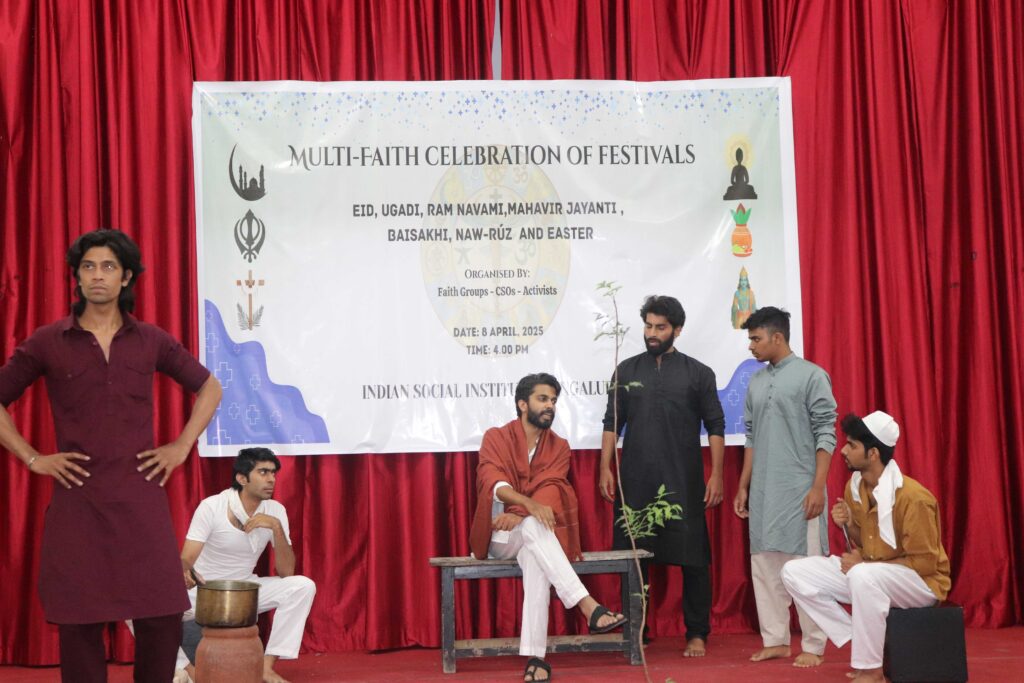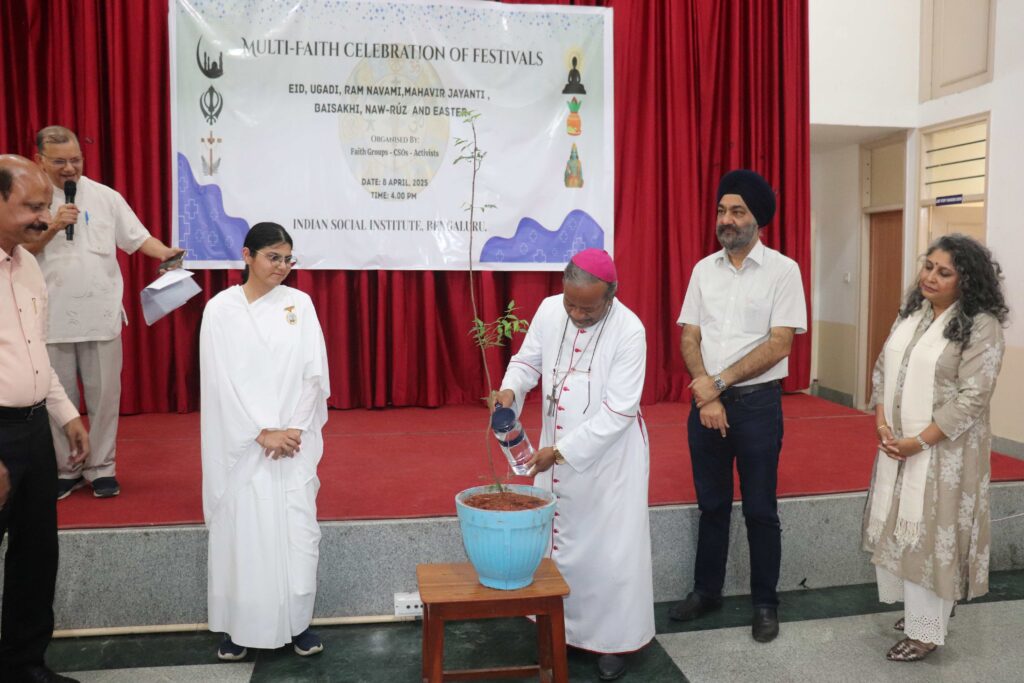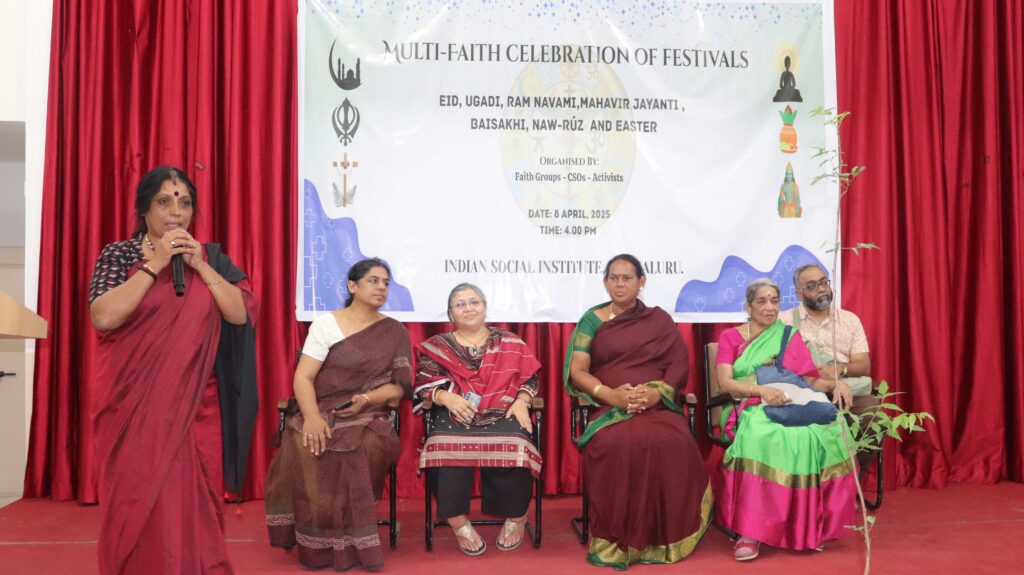


On 8 April 2025, the Indian Social Institute (ISI), Bengaluru, in collaboration with various faith groups, civil society organizations, and youth collectives, hosted a powerful and heartwarming “Multi-Faith Celebration of Festivals” on 8th April, 2025. The event marked the collective observance of Eid, Ugadi, Ram Navami, Mahavir Jayanti, Baisakhi, Naw-Rúz, and Easter — showcasing India’s rich tapestry of religious and cultural traditions. This unique event was part of a nationwide initiative held in 15 cities aimed at promoting interfaith understanding, peaceful coexistence, social harmony and mutual respect across communities.
At the outset, Fr. Selvaraj Arulnathan SJ, Director of ISI Bengaluru, delivered the Welcome Address, recognizing the importance of inter-faith respect and the need for such inclusive platforms.
The event began with the watering of a neem plant by leaders from multiple faiths — a symbol of nurturing peace, harmony and environmental consciousness, while the multilingual multi-faith prayer, “Manavta Ki Prarthana” (Prayer for Humanity) created a spiritual ambience in the auditorium.
Faith leaders and representatives offered reflections rooted in their respective traditions, echoing universal values of peace, love, and compassion. Mr. Arif Vakil, co-creator of Sufi Comic Series, shared spiritual reflections on Eid, emphasizing gratitude and mercy in Islam. He said that the best way to celebrate a festival is to understand its underlying purpose. He added that the single most important purpose common to all religions is sacredness and it inspires us to open our consciousness and move forward.
Mr. Baljeet Singh, the Managing Director of Simran Logistics, highlighted the message of Baisakhi as celebrating harvest, service, and Sikh community life. Ms. S.P. Malini, a former Chief sub-Editor in the Indian Express Group, spoke on Mahavir Jayanti, reflecting on the Jain principles of non-violence and spiritual discipline. Mr. Dinesh Rao, an engineer and CSR professional, offered insights on Bahá’í Naw-Rúz, a new year festival of the Bahá’í community, which celebrates unity and renewal. Brahmakumari Sister Bhavana, who is also a Chartered Accountant, shared the wisdom of self-transformation through Rajyoga meditation.
Tibetan Buddhist monks, Geshe Pema Wangchen, Geshe Jamyang Phuntsok and Geshe Tashi Dorjee, from the Dalai Lama Institute for Higher Education chanted sacred verses from Buddhist scriptures, before Mr. Jigmey Tsultrim, the Chief Representative of the Central Tibetan Administration (South Zone), delivered a moving message on the Buddhist principles of inner peace and compassion.
Most Rev. Dr. Peter Machado, Archbishop of Bangalore and the Guest of Honour on the occasion, delivered the keynote address. In his moving message on the occasion of Easter, he highlighted the symbolism of hope during the Easter season and remarked: “Festivals are the heartbeat of every culture, which celebrate the values of love, mercy and compassion that are common to all religions.” He emphasized that no one gains from conflicts, but the values of love, sacrifice, compassion and mercy give us reason to live harmoniously with others. His words encapsulated the essence of the evening — a shared longing for peace, unity and love across all faiths.
The cultural programme that was interspersed with messages from faith leaders featured a variety of rich cultural expressions that celebrated the spiritual essence of India. This included a graceful Bharatanatyam performance by Ms. Shakti Shivani and Ms. Kiran Shiny V.S., Soulful Sufi songs invoking devotion and unity sung by Aparoopa, a skit dramatizing the need for social harmony in the midst of conflict by Mr. Maahir Mohiuddin and team, and a heartfelt recitation of poetry composed by Ms. Minati Pradhan, capturing the spirit of oneness.
Another highlight of the programme was an all-women panel discussion on the living faith of people in a multi-religious society, which brought together voices of inter-faith experiences and activism. After Ms. Mamatha introduced the panelists, Ms. Anita Cheria, Ms. Ishrath Nisar, Ms. Aarathi Gowda and Ms. Meenakshi Srinivasan, they engaged in a thought-provoking conversation on the relevance of interfaith celebration of festivals in contemporary society in Bangalore. In particular, the sharing on Hindus providing Iftaar meals to Muslim brothers and sisters touched the hearts of the audience. These reflections emphasized the lived reality of coexistence in a multi-faith society and the power of simple initiatives to build peace and harmony in society.
Since this Multi-Faith Celebration was part of a national initiative of Multi-Faith Celebration of Festivals in about 15 cities in India coordinated by COVA peace Network, there was a sharing of the Multi-Faith Celebration that took place in Varanasi a couple of days ago on 6th April. Fr. Anand Mathew IMS, Convener of Sanjha Sanskriti Manch, Varanasi, shared his experiences of coordinating a similar celebration in the holy city of Varanasi. He said that people of all faiths donated blood and held Multi-Faith programmes, which demonstrates how interfaith harmony is resonating across India through grassroots efforts and faith-based collaborations.
Another special feature of the celebration was a ‘Peace Corner’ set up for the members of the audience to write messages of peace and pin it up on the board. A large number of people wrote messages of peace, harmony and new beginnings for a better world.
Finally, Fr. Denzil Fernandes SJ, Head of the Peace and Reconciliation Unit, delivered the Vote of Thanks, appreciating the speakers, artists, faith leaders, volunteers and the organising team for co-creating a meaningful and inclusive space on the occasion. The program concluded with the National Anthem, symbolizing shared citizenship and unity in diversity.
This Multi-Faith Celebration of Festivals was co-organised by Indian Social Institute, Bahutva Karnataka, Gamana Mahila Samaj, SIEDS, Inter-Religious Harmony Movement (IRHM), Vrikshabandhan Abhiyan, besides other civil society organisations and peace activists. It was more than just a spiritual and cultural gathering of over 120 people. It was a living example of India’s pluralistic spirit, an expression of hope, and a call to build bridges in our communities through dialogue, celebration, and collective compassion.
